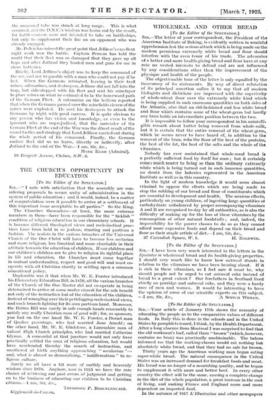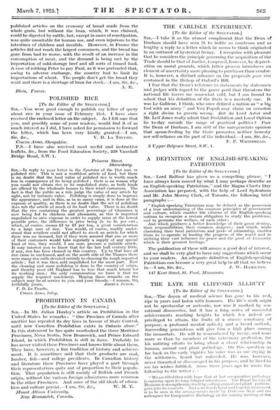[To the Editor of the Semmavron.1 SIR,—Your article of January
17th shows the necessity of educating the people as to the comparative values of different foods. In Italy this is done in the schools and in the United States by pamphlets issued, I think, by the Health Department.
After a long absence from Montreal I was surprised to find that the old workman's loaf, called there "brown" (which, however, contains no bran) was practically unobtainable. The bakers informed me that the working-classes would eat nothing but absolutely white bread, and that they had no sale for brown.
Thirty years ago the American working man began eating super-white bread. The natural consequence in the United States was an increased-demand for breakfast foods and meat. His bread was no longer of a nourishing quality, and he began to supplement it with more and •better beef. In every other country the effect will be the same, causing a complete change in the diet of the whole population, a great increase in the cost of living, and making France and England more and more dependent on imported food.
In the autumn of 1917 L' Illustration and other newspapers published articles on the economy of bread made from the whole grain, but without the bran, which, it was claimed, could be digested by cattle, but, except in cases of constipation, was quite unsuitable for human use, and even injurious to the intestines of children and invalids. However, in France the :articles did not reach the largest consumers, and the bread has gone from bad to worse, with the result of an increase in the consumption of meat, and the demand is being met by the importation of cold-storage beef and all sorts of tinned food. A case of robbing Peter to pay Paul, as it was pretended that, owing to adverse exchange, the country had to limit its importations of wheat. The people don't get the bread they want and there is a shortage of bran for stock.—I am, Sir, &c.,
A. R.
Blois, France.



























































 Previous page
Previous page